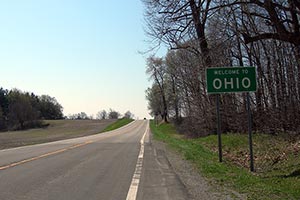Truck Registration Fee Cut is Out of Ohio Senate's Budget Bill

The Ohio Senate on March 22 unanimously approved a revised $7.8 billion, two-year transportation and public safety budget, but not before stripping out some proposed fee increases and a truck-registration pilot program in Lucas County.
The House, in turn, unanimously rejected the changes to House Bill 26, setting up a joint conference committee to hammer out a compromise.
The bill must reach Gov. John Kasich before April 1 if the state hopes to start spending the money on July 1.
RELATED: 'Crisis' in Ohio’s trucking industry spurs flurry of bills
Among other things, the budget — fueled primarily by federal highway dollars, motor fuel taxes and license and registration fees — provides funding for road and bridge improvements and the Ohio Highway Patrol.
The bill is sponsored by state Rep. Robert McColley.
It sets up an experiment on Interstate 670 through Columbus during which the state will vary speed limits and open paved shoulders as additional lanes to control traffic flow during rush hours and emergencies.
It provides investment in “smart corridor” technology on select highways in central and northeast Ohio in anticipation of self-driving vehicles.
The chamber removed a provision that would have allowed local privately operated deputy registrars to raise their service fees by $2 for registrations, licenses and identification cards and renewals. Deputy registrars say they need the increase to $5.25 to raise salaries to keep workers.
Instead, the bill requires the state Registrar of Motor Vehicles to act within nine months to set such fees via rule, with any increase not exceeding $2.
While the bill keeps a provision allowing counties to impose an additional $5 license tax, up to a total of $25, to raise more money for local roads and bridges, it now requires prior voter approval.
The County Commissioners Association of Ohio objected.
State Sen. Frank LaRose, chairman of the Senate Transportation, Commerce, and Workforce Committee, said lawmakers are aware tax and fee increases are unpopular.
“But when it’s justified, the public will support it — when they believe their money is being spent wisely…” he said.
“Is it not a reflection of the will of the people when they’re telling us they don’t want to see fee increases or tax increases?
“If they’re voting down a proposal like this, that reflects their will,” Senator LaRose said.
The House of Representatives had proposed creating a pilot program in four counties — Lucas, Montgomery, Clinton, and Stark — to see if reducing one key truck registration vehicle fee from $30 to $15 would lead to an increase in registrations in Ohio instead of other states.
The Senate scrapped that idea and instead kept a broader state study of the idea while also working to equalize truck registration fees with those of other states.
Distributed by Tribune Content Agency, LLC


